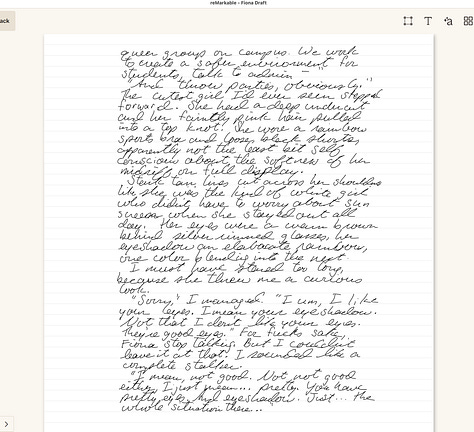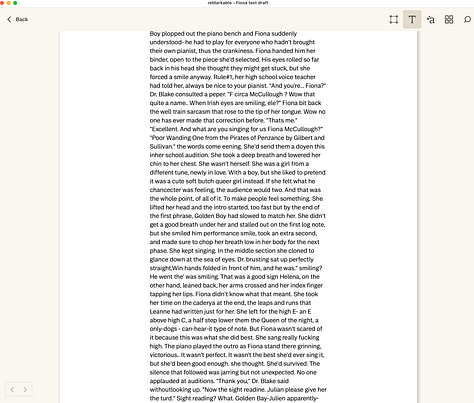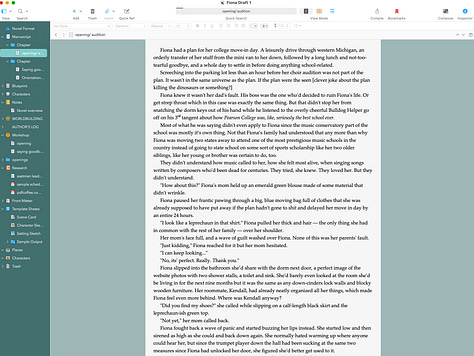“So… how do you actually write a novel? Like… what do you do?”
It’s a question that I’ve been asked a lot in the past few years as I’ve (slowly) begun to tell people in my non-writing life about my writing aspirations. I imagine it’s a question most, if not all, writers get. And yet, I never know quite how to answer it.
“One word at a time.”
“With a lot of swearing.”
“You type a lot of words and then delete them and then type more words and then delete those and then type more words and hate them and consider launching your laptop into the sun.”
Are all examples of answers I’ve given.
Sometimes people clarify that they mean, how do you develop the seed of an idea into a novel-length story, which I have another set of quips for because, I mean… I got an entire MFA learning how to do that and it doesn’t really reduce down to a 30 second explanation.
But sometimes they mean literally how do I write a novel? Do I type on my laptop on the couch? Do I sit at an Instagram worthy desk? Do I scribble in a notebook in a coffee shop?
Well, I have done all of those things. I’ve mostly written first drafts on my laptop because I can do it in my dedicated writing chair while my cat vies for my attention, and also when I have some free time at work (shhhhh don’t tell). I’m from the generation who learned how to type from Mavis Beacon and actually puts all my fingers on the correct keys and keeps them there.
I type about 90 words a minute according to the online typing speed test I just took out of curiosity, largely because I grew up in the era when, instead of texting, we had twelve AOL instant messenger conversations going on at once.
I always claimed that since I could type pretty much as fast as I could think, that this was the most effective way of getting my thoughts onto paper. Especially when dealing with a project that was going to be 90,000 or so words. Why would I want to do anything to slow down that process?
And I like being able to go back and fiddle with sentences I wrote the day before in order to get my head into a writing space, and I like being able to take a few tries at a sentence or a paragraph before I get it right. I like the feeling of my thoughts pouring through my fingers onto the screen. I like that feeling when everything else goes away.
But I also know a lot of authors who swear by writing longhand, at least for part of the process, and I’m trying to spend more time away from screens and technology right now, and I was curious how the process of writing by hand would feel different, and (and there is no way to phrase this without it sounding like an ad, but it’s not an ad I swear!) I recently bought a Remarkable, an e-notebook, that has a convert-to-text feature that makes writing by hand seem just the tiniest bit more efficient because when I’m done, I can copy-paste it into Scrivener.
All to say, I’ve decided / felt compelled to write the draft of my new novel by hand.
And so far, I like it.
I am genuinely finding – as promised by everyone who writes longhand – that it forges a different connection with my brain. My hand is slower than my brain, but that means that while my hand is finishing a sentence my brain is already formulating the next one. I spend less time staring into space, which means less time getting distracted by the millions of thoughts and tasks and distracting things that surround me. (Not, no time being distracted, but less.)
There’s no running word count constantly ticking at the bottom of my notebook, and so I’m finding that I think less about being done, less about checking off this task and moving on to do other things, and more about inhabiting this story that I’m desperately trying to tell.
I sink much more easily into the space where the rest of the world disappears writing by hand. I pick up much more easily from where I left off and I don’t feel like I need to spend time fiddling with the chapter before, or even the paragraphs before, when I first open up my notebook. I just jump back into the story. It feels nice.
And – again, I swear this is not an ad – I’m truly in love with my Remarkable. It feels like paper when writing, has a variety of pen options (my favorites are the fine tipped marker, and the calligraphy pen), and it recognizes my handwriting with astonishing accuracy. After I’m done with a chapter, I convert those pages to text, and move that page (it all comes out on one long, scrollable page) over to a different notebook with the other converted text. It feels really satisfying to see that I’ve finished a chapter. There it is alongside the rest of them. Slowly building the story.



After I finish converting and moving a chapter, I’ve been pasting it into my Scrivener project where I correct the spellings and turn it from one giant block of text into something that looks like a book. This also feels very satisfying, almost like a ritual. I’ve been doing it right away so far, so that the original words that have any errors on the convert to text are still in my mind, but I’m not sure I’ll be vigilant about it. It might be nice to have something to do to touch my project when my head isn’t in a drafting space. But I also like seeing the dates I completed chapters there in my Scrivener writing history, so I don’t know.
Maybe I’ll just see how I feel on any given day. I’m trying to be better about that.
I feel like the other thing writing longhand is doing, is helping me get past my perfectionist inner critic. It almost feels like I’m writing a long outline instead of a draft, which is so much less pressure to get right. I recently switched from third person to first, something that normally I would have felt compelled to go back and redo from the beginning, but this time I didn’t. I just switched. Mid paragraph even. And maybe at some point I’ll switch back, who knows!
I’m also finding that writing by hand is curbing my overwriting tendencies. If it seems tedious to write out by hand I… don’t… and that probably means it isn’t needed. Or maybe it is and I’ll put it in later, but I’d much rather need to add things than subtract. My plan is to retype everything anyway when I do my next draft. I normally do a lot of complete retyping in early drafts. And since I much much MUCH prefer revision to first drafting, I already feel better, knowing I’ll have a solid foundation to work with.
The downside to writing by hand?
It
Is
So
Fuck-
-ing
Slow.
It really is. As satisfying as the benchmarks feel, it is also hard for me to be writing at fully half the speed I normally do. Hard when people online boast about 10,000 word days, or drafting three books during NaNoWriMo or the eighteen projects they have going. I know that my writing life won’t ever look like that since I have a day job that I can not quit, but even away from social media, it is hard not to feel like publishing is going to pass me by.
It is also incredibly discouraging to know it will take days and days and days and days to get all 80,000 - 90,000 words of this story down. That’s SO many words. It’s so many pages. Art takes time, I know. But still. I’m impatient.
I’m impatient. And heartbroken at the world. And stressed about things in my own life.
And I have so many stories I want to tell and so much that I want to sink into this one.
And writing an entire novel is so difficult and so daunting, especially at the beginning.
“How do you actually write a novel? Like… what do you do?”
At the moment, I put on my writing playlist and I sit in my chair with my notebook and a cup of tea, and I try to shut out the stress and the sorrow and the endless list of things I can’t change or fix or ensure.
I try to find the next word and then write it down, again and again and again.




Another excellently wise essay, Alex. I love your writing voice, and your writing advice--keep it coming. (And keep writing. In long hand. Or not. Just keep on writing.)